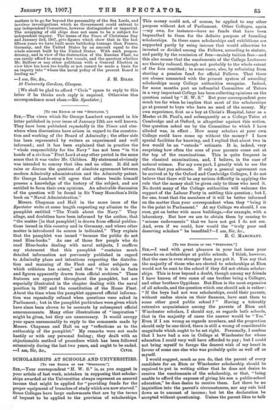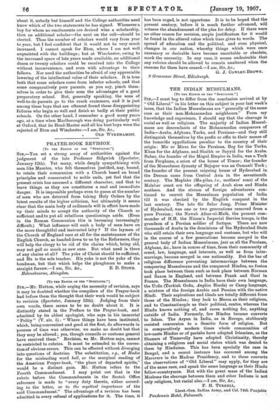[TO THR EDITOR OP THE " SPECTATOR. "] read with great pleasure
in your• last issue your remarks on scholarships at public schools. I think, however, that the case is even stronger than you put it. You say that the majority of those who are elected to scholarships at Eton would not be sent to the schdol if they did not obtain scholar- ships. This is true beyond a doubt, though among my friends I have known of two cases of one brother being a Colleger, and other brothers Oppidans. But Eton is the most expensive of all schools, and the question which one should ask is rather : " If the boys had not won scholarships, could their parents, without undue strain on their finances, have sent them to some other good public school ? " Having a tolerably extensive acquaintance among the parents of Eton and Winchester scholars, I should say, as regards both schools, that in the majority of cases the answer would be " Yes." Even if I am wrong as regards numbers, and the proportion should only be one-third, there is still a wrong of considerable magnitude which ought to be set right. Personally, I confess that I have bad a son in College at Winchester• for whose education I could very well have afforded to pay ; but I could not bring myself to forego the dearest wish of my heart in favour of some one else who was probably quite as well off as myself.
I would suggest, much as you do, that the parent of every candidate for an Eton or Winchester scholarship should be required to put in writing either that he does not desire to receive the emoluments of the scholarship, or that, "being unable to afford the expense of giving his son a public-school education," he does desire to receive them. Let there be no inquisition into the parent's circumstances, nor any rule laid down as to amount of income; but let the declaration be accepted without questioning. Unless the parent likes to talk
about it, nobody but himself and the College authorities need know which of the two statements be has signed. Whenever a boy for whom no emoluments are desired wins a scholarship, then an additional scholar—the next on the roll—should be elected. Thus the number of scholars would vary from year to year, but I feel confident that it would not be very much increased. I cannot speak for Eton, where I am not well acquainted with the buildings ; but at Winchester, owing to the increased space of late years made available, an additional dozen or twenty scholars could be received into the College without inconvenience, and even with advantage to their• fellows. Nor need the authorities be afraid of any appreciable lowering of the intellectual value of their• scholars. It is true both that some scholars come from inferior schools, and that some comparatively poor parents, as you say, pinch them- selves in order to give their sons the advantages of a good preparatory school. But, generally speaking, the sons of well-to-do parents go to the crack crammers, and it is just among these boys that are oftenest found those disappointing failures who begin so well and finish so badly at their• public schools. On the other hand, I remember a good many years ago, at a time when Marlborough was doing particularly well at Oxford, that its Head-Master said all his best boys were the rejected of Eton and Winchester•.—I am, Sir, &c., . OLD WYKEHANTST.







































 Previous page
Previous page